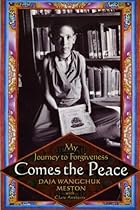Comes the Peace: My Journey to Forgiveness

| Author | : | |
| Rating | : | 4.49 (690 Votes) |
| Asin | : | 0743287614 |
| Format Type | : | paperback |
| Number of Pages | : | 272 Pages |
| Publish Date | : | 2015-02-26 |
| Language | : | English |
DESCRIPTION:
He made his way back to America, and eventually graduated from Brandeis University. Daja Wangchuk Meston, the son of American hippies, was ordained a Tibetan Buddhist monk in Nepal in the mid-1970s. He now lives in Boston with his Tibetan wife, Phuntsok (Phuni) Kim Dolma Meston, and her three newly arrived siblings.
In the early 1970s, at the age of three, he was taken by his hippie American parents to Nepal and left in the care of a Tibetan family. Daja had much to forgive. His mother became a Buddhist nun, and caring for a child, she thought, would impede her spiritual journey. With these, all his worldly possessions at the age of seventeen, Daja Wangchuk Meston caught an airliner to America, the unfamiliar land of which he was a citizen, and began his arduous personal journey to discover and mend his long-severed ties to his family, his country, and, in a very real sense, his own identity. His father, unbeknownst to the boy, had suffered a mental breakdown and returned, helpless, to Los Angeles. There, in scenes reminiscent of the novels of Charles Dickens, he was ostracized by the other boy monks, who taunted him for his Caucasian physical traits, left so hungry he stole scraps of bread, and slept on a flea-infested straw mat. The story of Daja's self-generated ouster from the monastery as an adolescent (he pretended. In this moving memoir, the author tells the incr
. Meston's (and Ansberry's) style is journalistically cut-and-dried and occasionally stifles the emotional turbulence that drives Weston's psychic journey, from abandoned child to lonely immigrant and suicidal prisoner. Meston later worked for Tibetan rights issues, traveling to Tibet, where he created a cause célèbre when he leaped out the window while under house arrest to avoid interrogation by Chinese officials. Meston was born in 1970 to a father who was a self-taught artist, and later descended into mental illness, and a mother who hailed from a wealthy Hollywood family and became so enraptured by Buddhist teachings that she became a nun in a Nepalese monastery. Meston spoke little English, had no formal educatio
Helen Stevens said Inspire Forgiveness. I was introduced to this book my someone at my church. Daja was then invited to speak at our church. I really enjoyed this book. Full of very descriptive phrases for places, emotions and relationships it kept me enthralled. Although his specific story is unique there is much each of us can gleam from it. Can you forgive someone who has hurt you and can you accept them for who they are and not who you want them to be? Daja's story made me take a look my relationships with those who have hurt me and those I may h. Patti Yim said Beautifully Written. Daja's journey truly inspires hope and gives you a fresh perspective on life, love, forgiveness and reminds us of how short life really is. I loved this book from beginning to end.. Reluctant Hero "If you have tears to shed, prepare to shed them now."Mark Anthony's invitation to weep over the body of his fallen hero, Julius Caesar, might well apply to the life of Taja Wangchuk Meston, an unwitting hero of the Tibetan people, his family, his friends and just about everybody else except himself. As told in his poignant biography "Comes the Peace: My Journey to Forgiveness," Meston's young life stretched him out through tragedy, abandonment, abuse, disaster, and near death. The reluctant hero lived a childh
